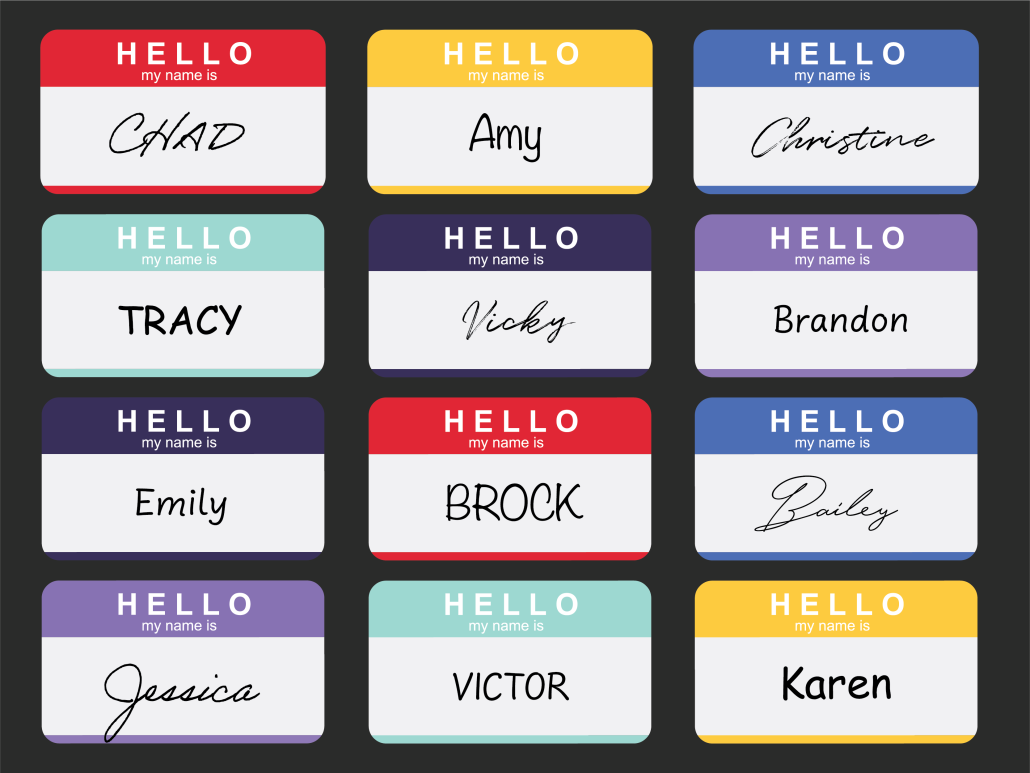How names determine whom we become
Ever since Rachel Green from “Friends” named her newborn baby Emma on that fateful day in 2002, classrooms across America have had to devise more and more clever ways of differentiating between the hoard of Emma variants that overpopulate the upcoming generation: Emma J., Little Emma, Emma With the Hot Tub, etc.
As a result of its long-standing popularity, the name is now regarded as a rather blank slate: something standard, predictable and rather vanilla.
Is every Emma, then, condemned to a life of nothing special? Just how much does a person’s name predetermine their character or even their fate?
Well, one way of answering this question is through the lens of evolutionary subjectivity: Caveman vision.
When we meet a new person — let’s call them Sam — we instantly flip through a Rolodex of all the other Sam’s we’ve ever known: Dad’s old boss, horse girl from eighth-grade science class, the cousin who’s always in the midst of a messy divorce. All of these formative experiences combine into a series of expectations we then use to confront this new Sam.
In short, caveman vision heavily relies on stereotyping.
This makes sense from a survivalist standpoint. If one snake bites, it isn’t far-fetched to assume others will too.
Some assumptions pop up consistently. Leonard Newman at Syracuse University asked 500 college students to rate 400 popular names. They tended to associate female names with lower levels of competence, while they associated male names with lower levels of warmth.
In that same vein, one study found that the same job application was rated more highly if it was labeled with a white-sounding name rather than a Black-sounding name.
While very depressing, it raises another question: What effect do these assumptions have on a person?
The answer to that question is a little more complex than caveman hubbub.
In 1954, psychologist Gustav Jahoda conducted research on the relationship between names and behavior. He discovered that Ashanti people believed that the weekday on which a person was born plays a significant role in determining who the child will become, with Monday-born boys becoming even-keeled and Wednesday-born boys becoming aggressive.
To test this superstition, Jahoda cross-referenced local juvenile court records to see if, in fact, more Wednesday-born men were predisposed to a life of crime. He found that the number of violent acts committed by boys born on Wednesday was much higher than could be explained away by chance.
This phenomenon has less to do with unlucky names and birthdates, and everything to do with the development of self-concept.
Self-concept is simply a collection of beliefs about oneself. It evolves as we do, and the messaging of others deeply affects it.
When we’re young, our parents’ messaging is the loudest. If they treat us like we’re good, we believe we are good. As we get older, we start valuing the messaging of other people, too: Friends, teachers, distant relatives, people on T.V., and soon enough our cup runneth over with external input.
Like most things, that information hardens over time. The result is a rather concrete belief in oneself. We have analyzed and re-analyzed vast amounts of data over decades, and our conclusion is such: We are, in a general sense, in all actuality, basically good.
Put briefly: We and everyone around us unconsciously follow a script when it comes to names. That doesn’t mean free will doesn’t exist — that’s a debate for another week. It suggests that even from the moment we are born, suppositions swirl about our head, and we owe it to ourselves to sift through the mess and decide what’s worth keeping. After all, why would we ever leave it to the general public to determine our life’s purpose?
This is a pretty good argument against groupthink and an even better argument against silly nomenclature.
The name “North West” is funny in theory, but how does a name like that affect a child’s development of self-concept? Sure, she’s American-royalty-level rich, but if her name is the butt of a thousand jokes, it’s plausible to suspect she isn’t being taken seriously; her voice may be getting lost in all of the laughter, assumptions and personal digs.
Or maybe she loves her name and wouldn’t change it for the world. Only time will tell. It’s certainly got a lot more personality than Emma J., so she’s got that going for her.
Puritan preacher William Jenkyn once proclaimed to his congregation: “A good name is a thread tyed about the finger, to make us mindful of the errand we came into the world to do for our Master.”
That’s a little self-righteous, and he unironically used the word “Master,” so deduct extra points. For these reasons — and more — Kimya Dawson said it better.
“Joey never met a bike that he didn’t wanna ride
And I never met a Toby that I didn’t like
Scotty liked all of the books that I recommended
Even if he didn’t I wouldn’t be offended.”


